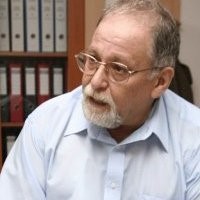Michael Shafir (born 1944) is a Romanian political scientist and journalist of Jewish origin. During the periods 1965–1967 and 1985–2005 he held various positions at Radio Free Europe and gradually asserted himself as an emblematic figure of the Romanian section of RFE. Born in Bucharest in a middle class Jewish family, Shafir emigrated legally to Israel in September 1961. Although his family was not politically persecuted, his father held strong beliefs that conflicted with the values promoted by the communist regime in Romania and thus distanced himself from the official propaganda from the early days of the new regime. Shafir confesses that his perception of the communist regime was definitely influenced by his early “anti-communist socialisation through jokes.” In this vein, he claims that his father mocked the official significance of such an event as Stalin’s death and even applied a lasting lesson to his son, who arrived home in tears because “our beloved father” had died. After dragging him to the bathroom and running the water tap, so that no-one would hear, he slapped the nine-year-old Michael and told him: “This is to remind you that your old man is still alive.” He also recalls that his family used to talk after the communist takeover about “how it was before [the Second World War],” and that “this before was idealised.”
In Israel, Shafir studied English philology, but chose political science as a second field of study. This decision marked his career, as well as his personal collection. While a student at the Hebrew University of Jerusalem, he worked for two years as analyst for the Audience and Public Opinion Research Department at Radio Free Europe (1965–1967). His activity consisted of analyzing letters received from Romania. Subsequently, he worked for the Israeli press and was employed as a junior lecturer at the Hebrew University of Jerusalem, where in 1981 he defended his doctoral dissertation on intellectuals under the Ceaușescu regime. Shafir returned to RFE in 1985, to occupy the position of deputy director of the Audience and Public Opinion Research Department, which he held until 1988. Most of his activity consisted of evaluating the audience of RFE in Eastern Europe on the basis of questionnaires answered by individuals coming from communist countries. Between 1988 and 1991, Shafir was head of the Romanian Research Unit of RFE. While working for RFE, he also published studies and books about Eastern Europe. After the fall of communism, he moved from Munich to Prague in 1997 and continued to work for RFE until 2005. Between October 2003 and November 2004 he was also a member of the International Commission for the Study of the Holocaust in Romania, headed by the Romanian-born American Jewish writer and Holocaust survivor Elie Wiesel. Between 2006 and 2012, Shafir was professor at the Faculty of European Studies of Babeş-Bolyai University, Cluj-Napoca, Romania.
According to his own assessment, Shafir would place himself in the category of an opponent to the communist regime in Romania, albeit one who manifested his opposition from exile through his activity at RFE. In fact, the most significant part of the Michael Shafir Collection originates from the period 1988–1991, when Shafir was head of the Romanian Research Unit of RFE. In this position, he was responsible for collecting, selecting, and analysing the information on Romania on which RFE programmes were based. This broadcasting agency played at that time an instrumental role in disseminating the messages of Romanian dissidents, and such messages reached it in various ways. Shafir thus had the chance to monitor an enormous amount of materials relating to Romania at a time when one of the most important topics of RFE broadcasts was the opposition to the Ceaușescu regime, however weak that might have been. This makes his collection an invaluable assembly of documents about Romanian dissent.
As for the concept of “cultural opposition,” Michael Shafir argued: “Here we have to make a distinction between dissidence and opposition. Things became confused because opposition in the Soviet Union started gradually to be called dissidence. Both dissidence and opposition are pre-conditioned by the willingness to make one’s voice heard. I have no idea how dissidence and, even more so, opposition can speak against the regime in a whisper. This is not opposition. Opposition must be [publicly] expressed.” In this respect, Shafir’s opinion mirrors that of the most notable dissidents in the Soviet bloc. On the other hand, Shafir has expressed his discontent with the term cultural opposition, “because in the Romanian case there is much talk about ‘opposition through culture,’” as he put it. This type of opposition, actually labelled “resistance through culture” by its practitioners in Romania, was no opposition at all according to Shafir. “Although among these cultural opponents I also found very respectable people, cultural opposition was a type of opposition […] which never assumed the risk of outspoken opposition. For me, Doina Cornea and few others like her, they were the opposition. Not a cultural opposition, but a perilous opposition, which took chances, courageous and, at the same time, modest […]. This is opposition,” concludes Shafir.

